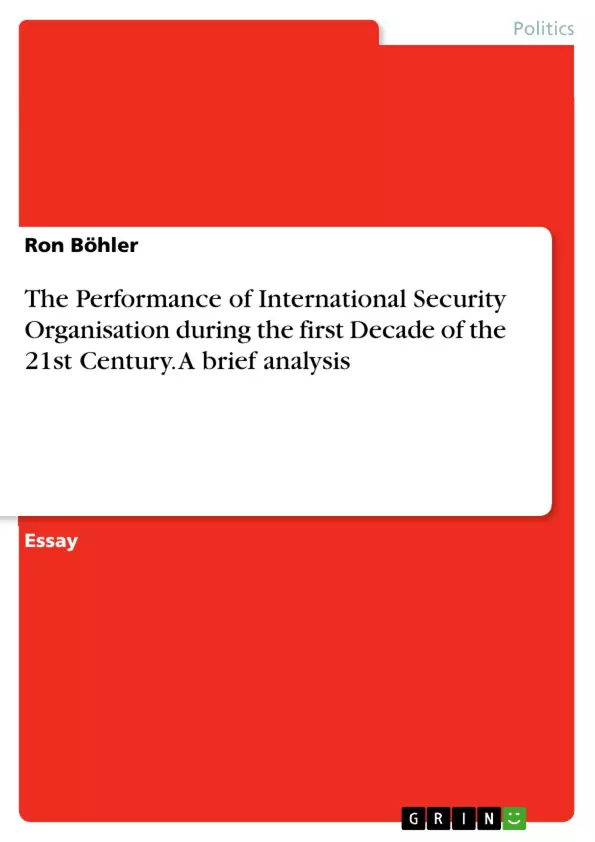‘Many international organizations [IO] have clearly succeeded in formulating, and sometimes implementing, policies that cannot be described as the simple product of interstate bargaining’ (Reinalda and Verbeek 1998, p.5). A closer look at international relations (IR) theories will quickly give indication that this statement is at odds with both neorealism and neoliberalism. In fact, these theories have for a long time neglected IO policy-making as well as the potential that IOs take purposive action as autonomous actors. Barnett and Finnemore hold that view and suggest a sociological perspective to treat IOs first and foremost as bureaucracies with independent agency.
The International Criminal Police Organisation (ICPO), better known as INTERPOL, is such a case. In the aftermath of the September 11 attacks on the World Trade Centre in New York, so will be argued below, INTERPOL remarkably improved institutional structures and strengthened its political scope of duties towards international terrorism. Its counter-terrorism strategies comprised technological innovation and bureaucratic efficiency with the objective of accelerating efficient crime fighting, on the one hand, as well as tightened cooperation with other (inter)national partner organisations with the aim of fostering a world-spanning anti-terrorist network, on the other. Both means go for the overall idea- and knowledge-based realignment that INTERPOL underwent in recent years under Secretary General Ronald K. Noble since his inauguration in 2000.
The essay is structured as follows: Throughout the first section, the sociological institutionalist approach of Barnett and Finnemore will be presented in comparative perspective to major IR theories. The approach suggests a number of assumptions and implications to the behavioural study of international organizations that will be elaborated further. The shortcomings, which are inherent in neorealist and neoliberalist concepts, will be seen as the starting point for the theoretical and empirical gains that the international bureaucracy approach provide. Subsequently, the concept will be applied to INTERPOL as an important international security organization in the field of counter-terrorism. Structural, political and technological adaptations that the organisation deployed in the aftermath of the 9/11 events make it a remarkable example of the accuracy and applicability of Barnett´s and Finnemore´s approach.
Inhaltsverzeichnis (Table of Contents)
- INTRODUCTION
- INTERNATIONAL BUREAUCRACIES AND IR THEORIES
- Neorealism
- Neoliberalism
Zielsetzung und Themenschwerpunkte (Objectives and Key Themes)
This research paper examines the performance of international security organizations during the first decade of the 21st century, focusing on the case of INTERPOL in the context of counter-terrorism. The paper utilizes the sociological institutionalist approach of Barnett and Finnemore to analyze the independent agency of international organizations within a framework that challenges traditional IR theories.
- The independent agency of international organizations (IOs)
- The role of IOs in international security
- The limitations of neorealism and neoliberalism in explaining IO behavior
- The impact of the September 11 attacks on INTERPOL's structure and operations
- The effectiveness of INTERPOL's counter-terrorism strategies
Zusammenfassung der Kapitel (Chapter Summaries)
- INTRODUCTION: The introduction presents the argument that international organizations can act independently and have a significant impact on international relations. This assertion challenges traditional IR theories such as neorealism and neoliberalism, which tend to focus on state-centric perspectives. The paper introduces INTERPOL as a case study and highlights its increased role in counter-terrorism after the September 11 attacks.
- INTERNATIONAL BUREAUCRACIES AND IR THEORIES: This section compares and contrasts the sociological institutionalist approach of Barnett and Finnemore to neorealism and neoliberalism. It argues that these traditional theories lack sufficient explanatory power when it comes to understanding the independent actions of IOs. The section examines how IOs can develop their own goals and pursue them independently of their member states.
- Neorealism: This subsection presents neorealism as a state-centric theory that emphasizes anarchy and the pursuit of power in the international system. Neorealism sees IOs as instruments of state policy and dismisses the possibility of independent IO action.
- Neoliberalism: This subsection explores neoliberalism, which acknowledges the possibility of cooperation and the role of IOs in promoting common interests. However, neoliberalism still maintains that states retain ultimate control over IOs and would not grant them true autonomy.
Schlüsselwörter (Keywords)
The key themes and concepts of this research paper include international security, international organizations, counter-terrorism, sociological institutionalism, neorealism, neoliberalism, INTERPOL, bureaucratic autonomy, and independent agency. The paper examines the performance of international security organizations, specifically INTERPOL, in the context of the post-9/11 world. It explores the limitations of traditional IR theories in explaining the actions of IOs and highlights the importance of recognizing the independent agency of these institutions.
Frequently Asked Questions
Can international organizations act independently of their member states?
Yes, according to sociological institutionalism, international organizations (IOs) can act as autonomous bureaucracies with their own goals and agency.
How did the 9/11 attacks change INTERPOL?
After the attacks, INTERPOL significantly improved its institutional structures, technological innovation, and counter-terrorism strategies to foster a global anti-terrorist network.
What are the limitations of Neorealism regarding international organizations?
Neorealism views IOs merely as instruments of state policy and fails to explain their potential for independent action or bureaucratic autonomy.
Who is Ronald K. Noble in the context of INTERPOL?
He served as Secretary General starting in 2000 and led the realignment of INTERPOL towards a more idea- and knowledge-based security organization.
What is the focus of the sociological institutionalist approach by Barnett and Finnemore?
It treats IOs as bureaucracies that possess independent agency, allowing them to formulate policies that are not just simple products of interstate bargaining.
- Citar trabajo
- Ron Böhler (Autor), 2011, The Performance of International Security Organisation during the first Decade of the 21st Century. A brief analysis, Múnich, GRIN Verlag, https://www.grin.com/document/376551



